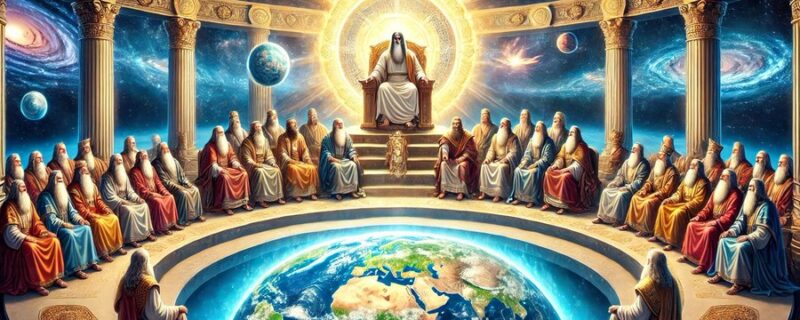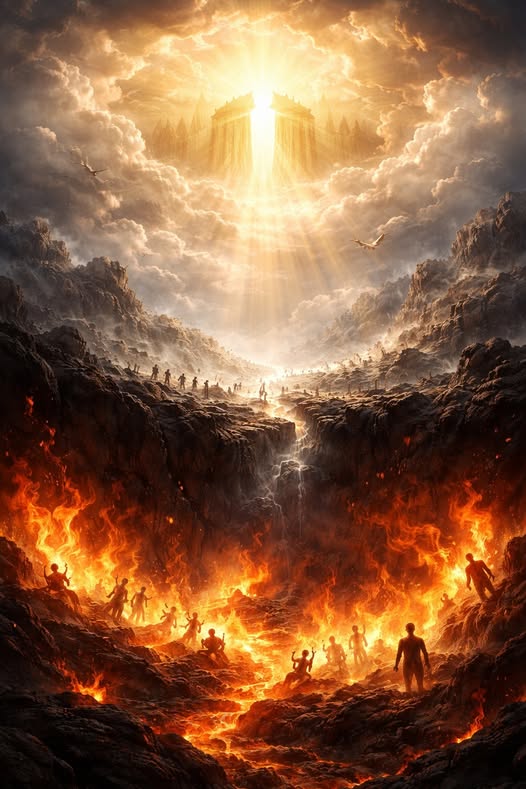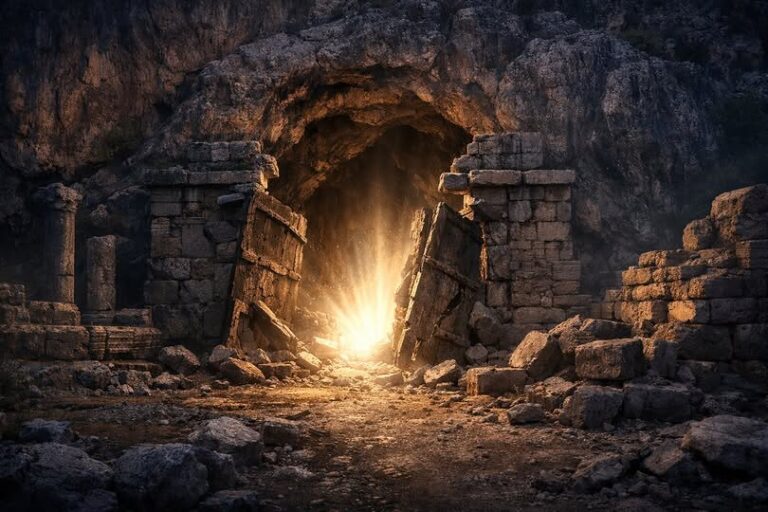
The Divine Council Worldview, championed by scholars like Dr. Michael Heiser, offers a fascinating lens through which to interpret the biblical narrative. This worldview posits that Yahweh, the God of Israel, presides over a council of lesser divine beings who were assigned to govern the nations. This article explores the key aspects of how this worldview explains the relationship between the divine council and the nations.
The Disinheritance of the Nations
A pivotal moment in the Divine Council Worldview is the incident of the Tower of Babel, described in Genesis 11:1-9. Humanity’s attempt to build a tower reaching the heavens was seen as an act of rebellion against Yahweh. In response, Yahweh confused their language, causing them to scatter across the earth. According to this worldview, this event led to the disinheritance of the nations, as articulated in Deuteronomy 32:8-9. The passage suggests that the Most High divided the nations and assigned them to be governed by lesser divine beings, while retaining Israel as His own portion.
“When the Most High gave the nations their inheritance, when he divided all mankind, he set up boundaries for the peoples according to the number of the sons of God. For the Lord’s portion is his people, Jacob his allotted inheritance.” (Deuteronomy 32:8-9, NIV)
Psalm 82: Judgment of the Gods
Psalm 82 is a critical text for understanding the Divine Council Worldview. In this Psalm, Yahweh stands in the divine assembly and judges the ‘gods’ for their failure to administer justice and righteousness among the nations. These divine beings are condemned for their negligence and are warned of their eventual demise.
“God has taken his place in the divine council; in the midst of the gods he holds judgment: ‘How long will you judge unjustly and show partiality to the wicked? … You are gods, sons of the Most High, all of you; nevertheless, like men you shall die, and fall like any prince.'” (Psalm 82:1-2, 6-7, ESV)
The Vision of Daniel 10
The Book of Daniel provides further insights into the Divine Council Worldview. In Daniel 10, a vision reveals a spiritual battle involving the ‘prince of Persia’ and the ‘prince of Greece,’ interpreted as spiritual entities or fallen divine beings associated with these nations. The archangel Michael, referred to as ‘your prince,’ is associated with Israel, suggesting a guardian role for the divine beings over specific nations.
“The prince of the kingdom of Persia withstood me twenty-one days, but Michael, one of the chief princes, came to help me.” (Daniel 10:13, ESV)
The Nations in the New Testament
The Divine Council Worldview extends into the New Testament, where the defeat of these rebellious divine beings and the reclaiming of the nations is a central theme. The Great Commission in Matthew 28:19-20 is seen as a directive to reclaim the nations for Yahweh through the spread of the gospel.
“Go therefore and make disciples of all nations, baptizing them in the name of the Father and of the Son and of the Holy Spirit.” (Matthew 28:19, ESV)
Paul’s writings also reflect this spiritual battle against these powers and principalities. Ephesians 6:12 emphasizes the struggle against these spiritual forces.
“For we do not wrestle against flesh and blood, but against the rulers, against the authorities, against the cosmic powers over this present darkness, against the spiritual forces of evil in the heavenly places.” (Ephesians 6:12, ESV)
The Ultimate Redemption
The Divine Council Worldview holds that the eschatological vision includes the restoration of all nations under Yahweh’s rule. Revelation 21:24-26 describes the nations walking by the light of the New Jerusalem, indicating a future where the divided nations are united in worshiping Yahweh.
“By its light will the nations walk, and the kings of the earth will bring their glory into it, and its gates will never be shut by day—and there will be no night there. They will bring into it the glory and the honor of the nations.” (Revelation 21:24-26, ESV)
Conclusion
The Divine Council Worldview provides a rich and complex understanding of the biblical narrative, particularly concerning the nations. It suggests that Yahweh’s judgment at Babel led to the disinheritance of the nations and their governance by lesser divine beings, who ultimately failed in their duties. This failure set the stage for the ultimate redemption and reunification of the nations under Yahweh through the work of Christ and the mission of the Church. This perspective invites believers to see the cosmic scope of God’s redemptive plan, encompassing all nations and peoples.
Discussion Question
- The Role of the Divine Council: How does the concept of the Divine Council and its governance over the nations influence our understanding of the biblical narrative and Yahweh’s sovereignty? What implications does this have for interpreting events in the Old Testament, such as the disinheritance of the nations at Babel?
- Theological Implications: In what ways does the Divine Council Worldview challenge or support traditional Christian views on the nature of spiritual beings and their roles? How do passages like Psalm 82 and Daniel 10 reshape our understanding of spiritual warfare and the cosmic struggle described in the Bible?
- Reclaiming the Nations: Considering the New Testament emphasis on the Great Commission and the reclaiming of the nations for Yahweh, how should modern Christians approach missions and evangelism? What does this worldview suggest about the ultimate reconciliation and unity of all nations under God’s rule as described in Revelation?
Want to Know More?
- The Unseen Realm: Recovering the Supernatural Worldview of the Bible by Michael S. Heiser: This book provides an in-depth exploration of the divine council and its implications for understanding the Bible’s supernatural worldview.
- God’s Rivals: Why Has God Allowed Different Religions? Insights from the Bible and the Early Church by Gerald R. McDermott: This book examines the biblical and historical perspectives on the existence of other religions and spiritual beings, offering insights into the divine council and the role of other gods in the biblical narrative.
- Angels: What the Bible Really Says About God’s Heavenly Host by Michael S. Heiser: This book focuses on the biblical portrayal of angels, their roles, and their relation to the divine council, providing a comprehensive look at how these heavenly beings fit into the broader supernatural worldview of the Bible.




